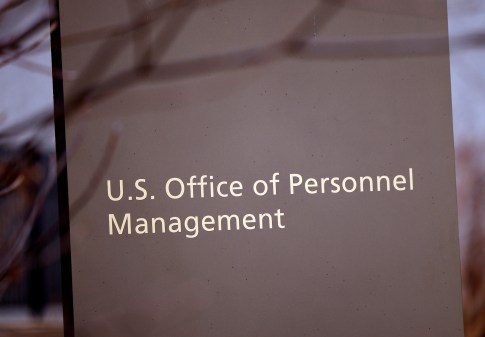Lawmakers to agencies: Stop dragging your feet on doc requests


Rep. Jason Chaffetz, the House Oversight and Government Reform Committee Chairman, holds up heavily redacted documents provided to him by the Office of Personnel Management during a hearing Thursday. (YouTube)
Federal agencies are falling woefully short on delivering documents requested by the House Oversight and Government Reform Committee, and members took umbrage during a Thursday hearing, accusing agency officials of trying to hide the truth from Congress.
It was an adversarial and at times acrimonious face-off between lawmakers of both parties and officials they slammed for dragging their feet in aiding the committee’s oversight. Some Democratic congressmen counter-charged that the GOP leaders of the panel were singling out politically advantageous fights to pick with the administration — although no officials echoed that.
Rather, representatives from the Justice Department, Homeland Security Department, Office of Personnel Management, State Department, and the White House’s Office of Management and Budget told the committee they have been inundated with congressional requests and have worked tirelessly to fulfill the hundreds they have received over the past few years.
But, when it comes to requests for information related to high-profile incidents, such as the two data breaches at OPM or the Supreme Court case that dealt with the Justice Department use of GPS, Rep. Jason Chaffetz, R-Utah, said agencies consistently report the number of documents they produce — rather than the percentage — as a way to obfuscate their failure to give the committee what lawmakers want.
“When they want to talk about the number of documents they produced, I’m not interested in that,” Chaffetz said. “I’m interested in the percentage of documents that you produced. If we want 100 percent of the truth, we’re going to need 100 percent of the documents. Until we get them, it makes us think that you’re hiding something.”
Chaffetz was particularly irritated with the fact that OPM has sent documents that have been fully redacted, preventing the committee from learning any more about the data breaches that affected millions of current and former federal employees.
“The extraordinary lengths OPM has gone to keep basic information from the committee, leaves us with the conclusion that perhaps they’re having a lot to hide,” he said. “If something’s embarrassing, that’s not a reason to keep it from the Congress.”
When told by Jason Levine, OPM’s director of congressional, legislative and intergovernmental affairs that the redactions were to protect people’s privacy, the committee chair scoffed at what he believed to be double-speak coming from OPM CIO Donna Seymour on whether the information provided was the information Chaffetz asked for.
“She tried to get us to go away,” Chaffetz said. “That was a lie. She misled Congress. She is going to pay the price.”
That adversarial tone was woven throughout the hearing, as when multiple committee members pressed Peter Kadzik, DOJ’s assistant attorney general of legislative affairs, for reports on the department’s policies on geolocation and other surveillance technologies.
At one point, Rep. Tim Walberg, R-Mich., grew indignant after Kadzik pointed out both Walberg and the Justice Department have the American people’s interest at heart when it comes to crafting policy.
“You do not represent the American people,” Walberg told Kadzik. “We do.”
A few committee members tried to push through the tension to common ground, saying that both the committee and federal agencies were to blame, and noting politics often leads to antagonistic behavior. Rep. Stephen Lynch, D-Mass., called the committee on the carpet for picking its confrontations when it’s politically expedient.
“Sometimes on this side of the dais, we [in Congress] are responsible for that adversarial relationship,” he said.
Lynch called into question why the committee has hammered former Secretary of State Hillary Clinton over her use of a private email server, when another former secretary, Colin Powell, admitted to doing the same after he expressed frustration with his government-owned email address.
“We have this situation where Clinton has been pummeled with hearings, but you have Powell who testified before the U.N. Security Council that there were weapons of mass destruction in Iraq, and we give him a complete pass,” Lynch said. “That makes us look tremendously biased.”
Rep. Gerry Connolly, D-Va., found middle ground, saying the way in which the government is set up lends itself to the adversarial nature between the two government branches.
“The Constitution builds a dialectic in which we want information and the executive branch does not want to give it,” he said. “It does rely at the end of the day, on common sense, on good faith, on determination as well as statutory enablers.”
However, Connolly said it’s on everyone to move past this political acrimony if the U.S. government is function properly.
“Blatantly partisan efforts to seek information to embarrass, humiliate and undermine will not get bipartisan support and can understandably cause even more friction in the executive branch in trying to be responsive,” he said.
Watch the full hearing on YouTube.
Update, 1/7/16, 5:47 p.m: An earlier version of this story stated that Jason Levine said the redactions in the documents provided by OPM were to guard against “personally identifiable information.” He actually said the redactions were to “protect people’s privacy.” The passage has been edited.
Contact the reporter on this story via email at greg.otto@fedscoop.com, or follow him on Twitter at @gregotto. His OTR and PGP info can be found here.Subscribe to the Daily Scoop for stories like this in your inbox every morning by signing up here:fdscp.com/sign-me-on.






